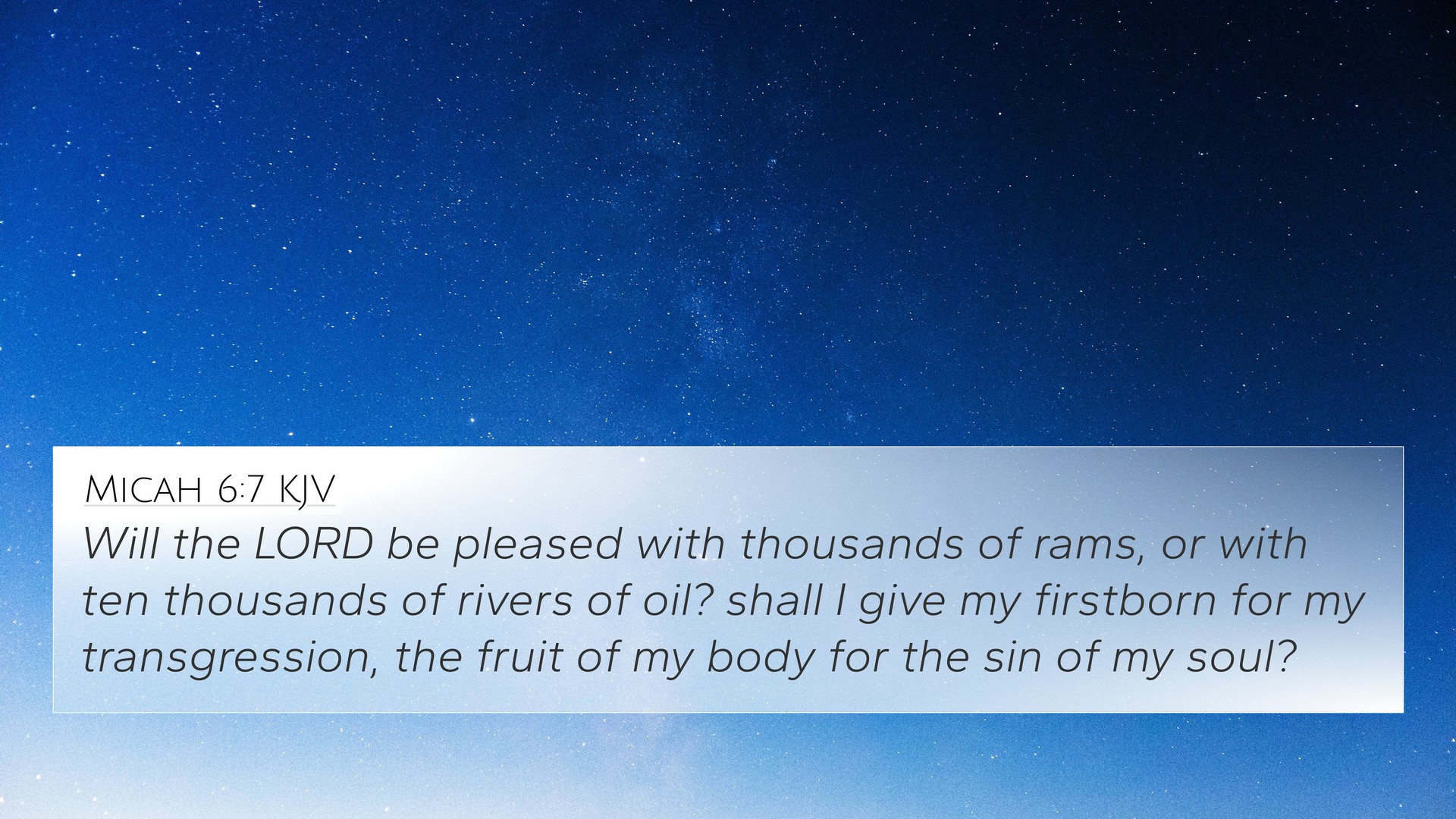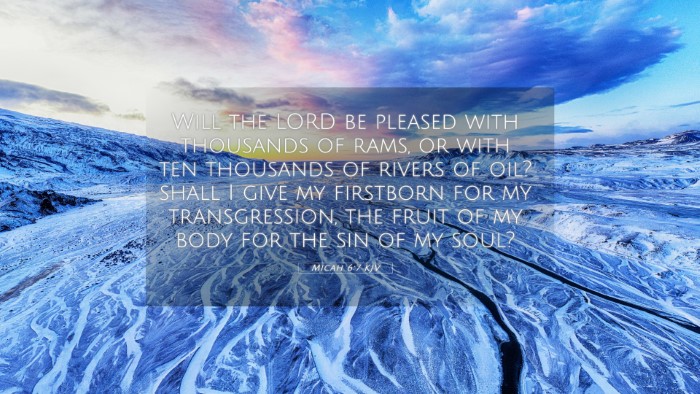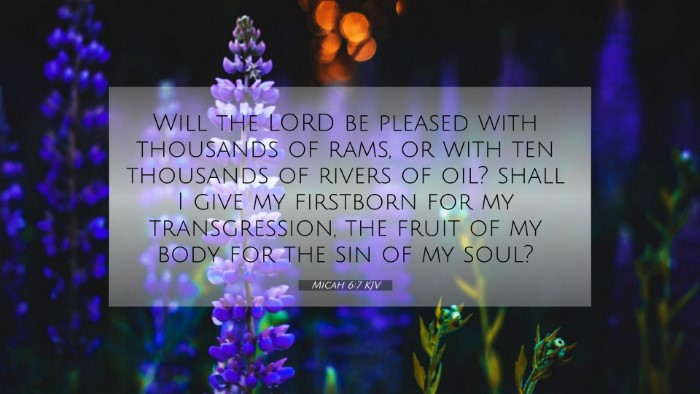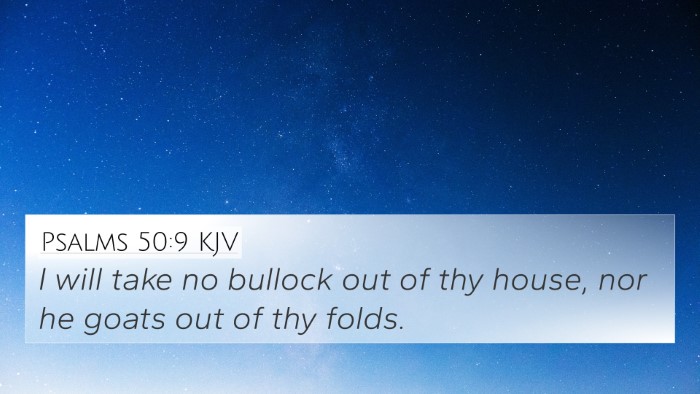Old Testament
Genesis Exodus Leviticus Numbers Deuteronomy Joshua Judges Ruth 1 Samuel 2 Samuel 1 Kings 2 Kings 1 Chronicles 2 Chronicles Ezra Nehemiah Esther Job Psalms Proverbs Ecclesiastes Song of Solomon Isaiah Jeremiah Lamentations Ezekiel Daniel Hosea Joel Amos Obadiah Jonah Micah Nahum Habakkuk Zephaniah Haggai Zechariah MalachiMicah 6:7 Similar Verses
Micah 6:7 Cross References
Will the LORD be pleased with thousands of rams, or with ten thousands of rivers of oil? shall I give my firstborn for my transgression, the fruit of my body for the sin of my soul?
Uncover the Rich Themes and Topics of This Bible Verse
Listed below are the Bible themes associated with Micah 6:7. We invite you to explore each theme to gain deeper insights into the Scriptures.
Micah 6:7 Cross Reference Verses
This section features a detailed cross-reference designed to enrich your understanding of the Scriptures. Below, you will find carefully selected verses that echo the themes and teachings related to Micah 6:7 KJV. Click on any image to explore detailed analyses of related Bible verses and uncover deeper theological insights.

2 Kings 16:3 (KJV) »
But he walked in the way of the kings of Israel, yea, and made his son to pass through the fire, according to the abominations of the heathen, whom the LORD cast out from before the children of Israel.
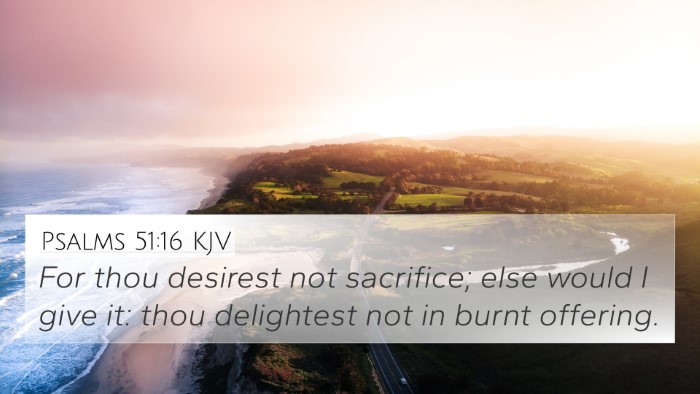
Psalms 51:16 (KJV) »
For thou desirest not sacrifice; else would I give it: thou delightest not in burnt offering.
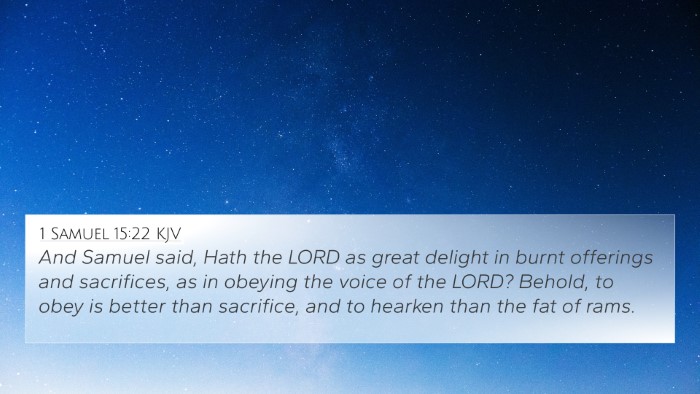
1 Samuel 15:22 (KJV) »
And Samuel said, Hath the LORD as great delight in burnt offerings and sacrifices, as in obeying the voice of the LORD? Behold, to obey is better than sacrifice, and to hearken than the fat of rams.
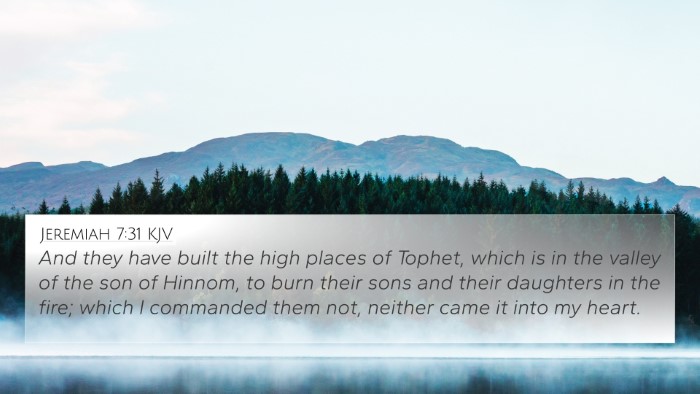
Jeremiah 7:31 (KJV) »
And they have built the high places of Tophet, which is in the valley of the son of Hinnom, to burn their sons and their daughters in the fire; which I commanded them not, neither came it into my heart.
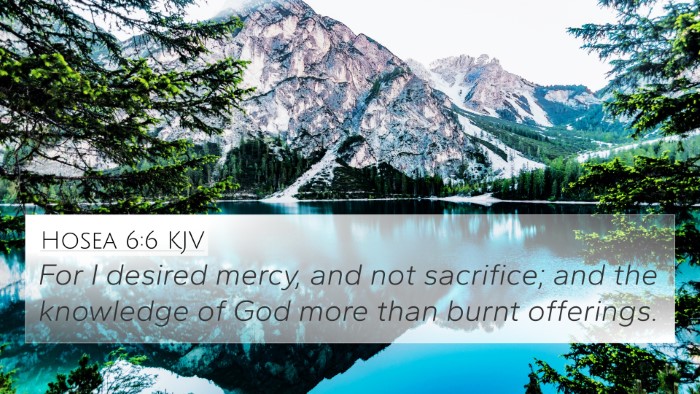
Hosea 6:6 (KJV) »
For I desired mercy, and not sacrifice; and the knowledge of God more than burnt offerings.
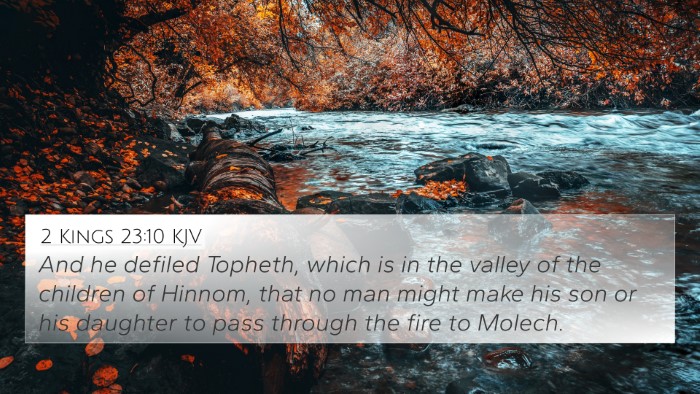
2 Kings 23:10 (KJV) »
And he defiled Topheth, which is in the valley of the children of Hinnom, that no man might make his son or his daughter to pass through the fire to Molech.
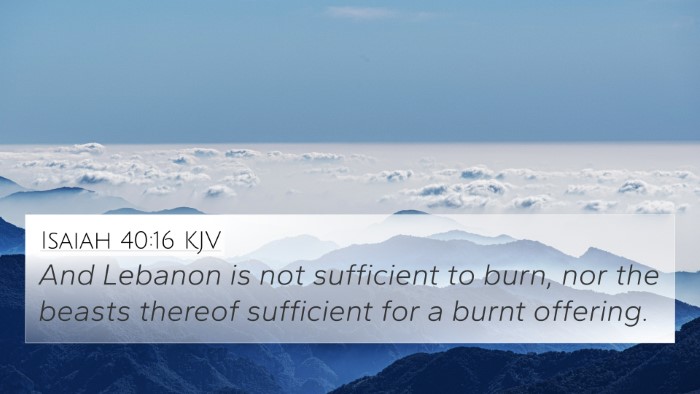
Isaiah 40:16 (KJV) »
And Lebanon is not sufficient to burn, nor the beasts thereof sufficient for a burnt offering.
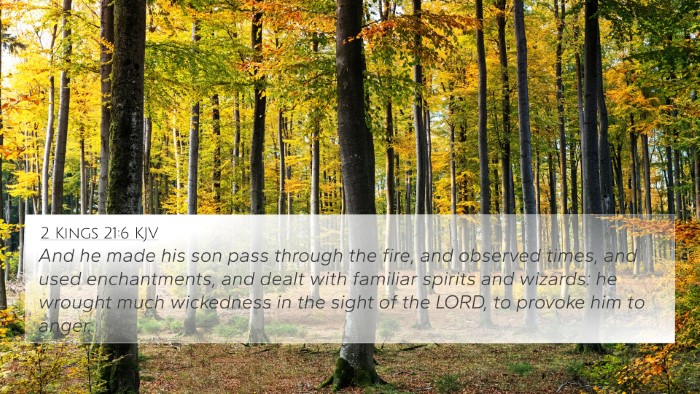
2 Kings 21:6 (KJV) »
And he made his son pass through the fire, and observed times, and used enchantments, and dealt with familiar spirits and wizards: he wrought much wickedness in the sight of the LORD, to provoke him to anger.
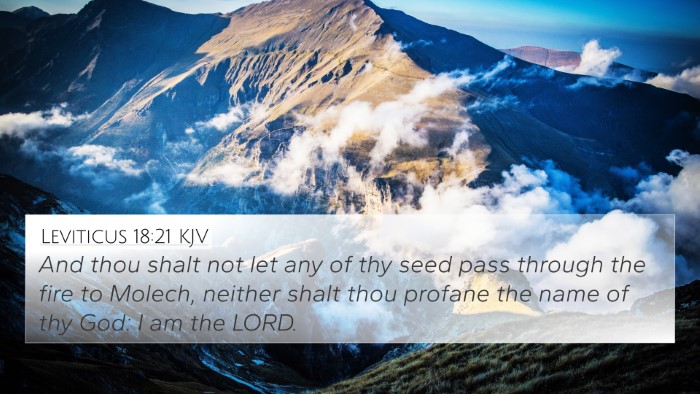
Leviticus 18:21 (KJV) »
And thou shalt not let any of thy seed pass through the fire to Molech, neither shalt thou profane the name of thy God: I am the LORD.
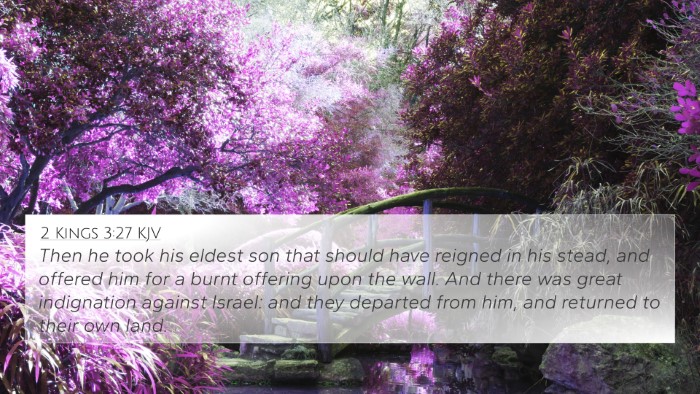
2 Kings 3:27 (KJV) »
Then he took his eldest son that should have reigned in his stead, and offered him for a burnt offering upon the wall. And there was great indignation against Israel: and they departed from him, and returned to their own land.
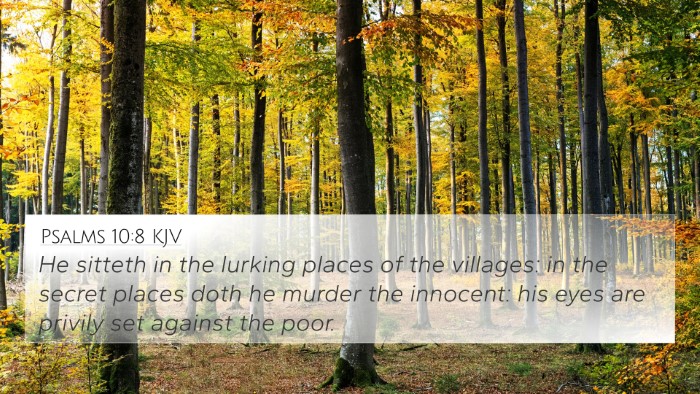
Psalms 10:8 (KJV) »
He sitteth in the lurking places of the villages: in the secret places doth he murder the innocent: his eyes are privily set against the poor.
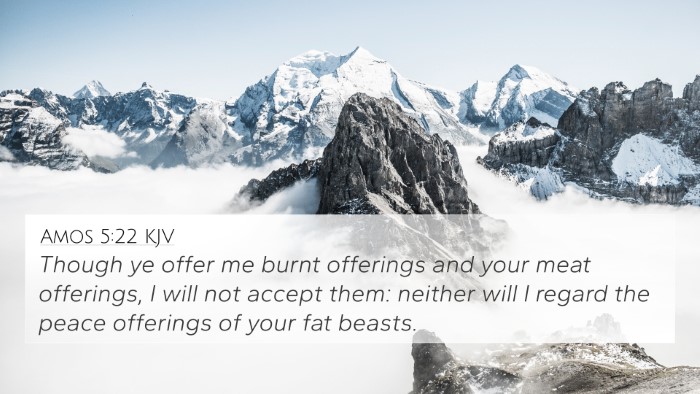
Amos 5:22 (KJV) »
Though ye offer me burnt offerings and your meat offerings, I will not accept them: neither will I regard the peace offerings of your fat beasts.

Judges 11:31 (KJV) »
Then it shall be, that whatsoever cometh forth of the doors of my house to meet me, when I return in peace from the children of Ammon, shall surely be the LORD's, and I will offer it up for a burnt offering.
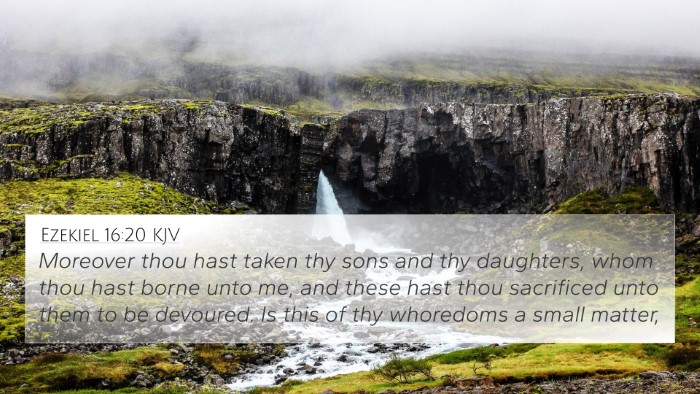
Ezekiel 16:20 (KJV) »
Moreover thou hast taken thy sons and thy daughters, whom thou hast borne unto me, and these hast thou sacrificed unto them to be devoured. Is this of thy whoredoms a small matter,
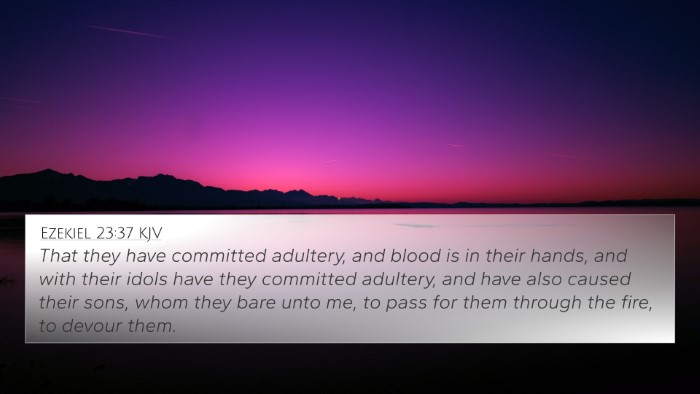
Ezekiel 23:37 (KJV) »
That they have committed adultery, and blood is in their hands, and with their idols have they committed adultery, and have also caused their sons, whom they bare unto me, to pass for them through the fire, to devour them.
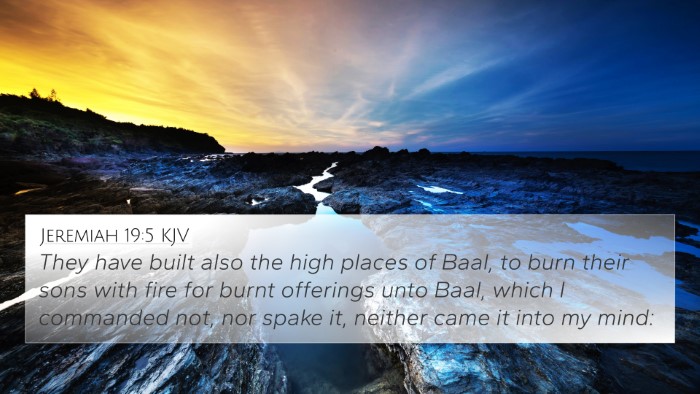
Jeremiah 19:5 (KJV) »
They have built also the high places of Baal, to burn their sons with fire for burnt offerings unto Baal, which I commanded not, nor spake it, neither came it into my mind:
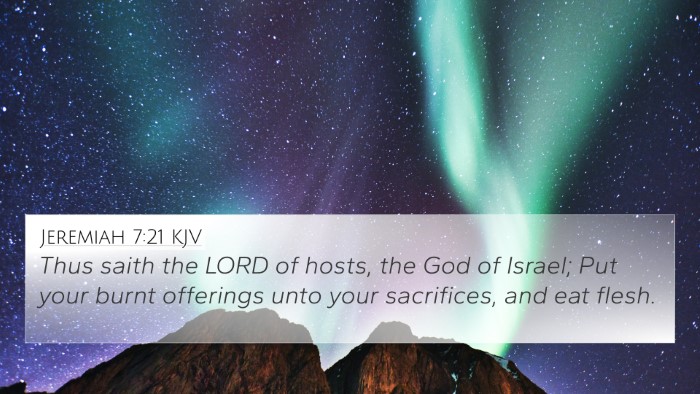
Jeremiah 7:21 (KJV) »
Thus saith the LORD of hosts, the God of Israel; Put your burnt offerings unto your sacrifices, and eat flesh.
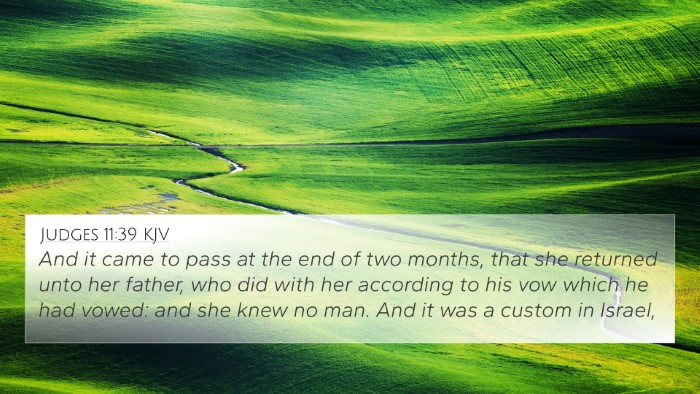
Judges 11:39 (KJV) »
And it came to pass at the end of two months, that she returned unto her father, who did with her according to his vow which he had vowed: and she knew no man. And it was a custom in Israel,
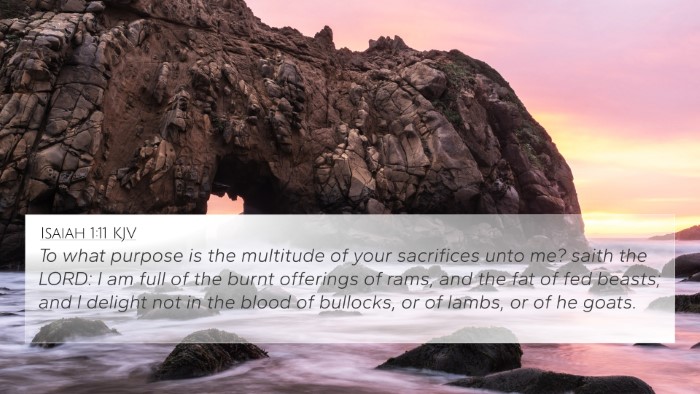
Isaiah 1:11 (KJV) »
To what purpose is the multitude of your sacrifices unto me? saith the LORD: I am full of the burnt offerings of rams, and the fat of fed beasts; and I delight not in the blood of bullocks, or of lambs, or of he goats.
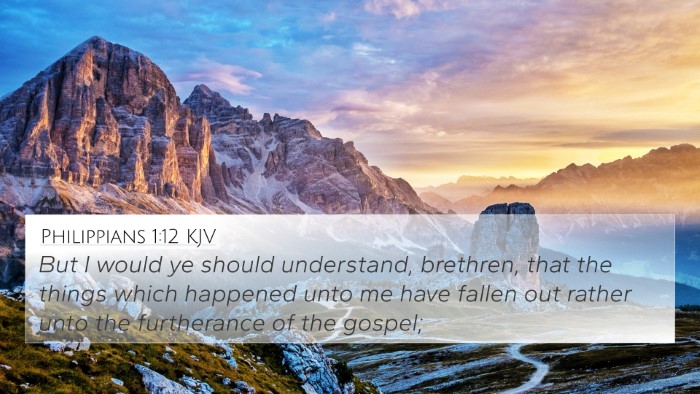
Philippians 1:12 (KJV) »
But I would ye should understand, brethren, that the things which happened unto me have fallen out rather unto the furtherance of the gospel;
Micah 6:7 Verse Analysis and Similar Verses
Understanding Micah 6:7
Micah 6:7 reads: "Will the Lord be pleased with thousands of rams, with ten thousand rivers of oil? Shall I give my firstborn for my transgression, the fruit of my body for the sin of my soul?" This verse explores the futility of ritualistic offerings without genuine repentance and moral righteousness.
Summary of Micah 6:7
This passage illustrates a heartfelt inquiry into what God truly desires from His people. The speaker contemplates exchanging wealth and even their own child as sacrifices. However, these offerings are insufficient if not accompanied by true contrition and a commitment to justice.
The structured rhetoric emphasizes that outward displays of religion are meaningless if they do not stem from an inner transformation. It highlights the disconnect between ritual observance and the substantive moral and ethical obligations required by God.
Biblical Context
Micah, a prophet during the reign of several kings of Judah, proclaims that the people have strayed into empty rituals while neglecting the essential nature of their relationship with God. This chapter confronts the idea that God desires more than just ceremonial offerings; He seeks a heart that is aligned with His justice and mercy.
Key Themes
- True Worship: God desires authenticity over empty rituals.
- Justice and Mercy: The verse reflects the importance of justice and moral conduct.
- Repentance: Highlighting the need for genuine remorse for sin.
Cross-References and Biblical Connections
Micah 6:7 finds rich connections throughout scripture, emphasizing its themes:
- 1 Samuel 15:22: "Has the Lord as great delight in burnt offerings and sacrifices, as in obeying the voice of the Lord?"
- Isaiah 1:11-13: Criticism of hollow religious practice.
- Hosea 6:6: "For I desire mercy, not sacrifice, and acknowledgment of God rather than burnt offerings."
- Psalm 51:16-17: "For You do not desire sacrifice, or else I would give it; You do not delight in burnt offering."
- Romans 12:1: The call to offer oneself as a living sacrifice, holy and pleasing to God.
- Micah 6:8: "He has shown you, O man, what is good; And what does the Lord require of you but to do justly, to love mercy, and to walk humbly with your God?"
- Matthew 5:23-24: Jesus emphasizes reconciliation over ritual offerings.
Commentary Insights
This verse has been explored in various commentaries, each highlighting different aspects of its meaning:
- Matthew Henry: Stresses that mere sacrifices cannot compensate for the absence of righteousness and that true repentance must come from the heart.
- Albert Barnes: Explains that God is not satisfied with great sacrifices if they come from those who are not sincere in their worship and ethical conduct.
- Adam Clarke: Notes the absurdity implied in the question of whether extreme offerings can appease God, emphasizing moral conduct over material sacrifice.
Theological Implications
The implications of Micah 6:7 stretch far beyond its immediate context, shaping a theological understanding of what God expects from His followers. It reminds believers that:
- True worship involves a commitment to justice and mercy.
- Genuine faith is reflected in actions and attitudes toward others.
- Empty rituals can lead to spiritual bankruptcy.
Application for Today
In today’s context, believers can ask themselves how they are honoring God beyond mere ritualistic practices. This verse challenges individuals to embody the principles of love, justice, and humility in their lives, ensuring their worship is aligned with God’s desires.
Conclusion
Micah 6:7 serves as a poignant reminder that God values the authenticity of a person's faith over ceremonial acts. It urges believers to reflect on their spiritual lives and seek deeper connections with God through righteous living, compassion, and ethical actions.
Further Study: Tools for Cross-Referencing
For those interested in further exploration of the themes in Micah 6:7, various tools for Bible cross-referencing and Bible concordance resources are available. These materials can guide you in identifying and studying connections between Bible verses and thematic Bible verse connections. Some useful methods include:
- Using a Bible cross-reference guide: Helps in locating verses that share thematic or contextual similarities.
- Bible cross-reference systems: Utilize indices or digital tools that highlight associated scripture.
- Cross-referencing Bible study methods: Combine multiple interpretations for a deeper understanding of scripture.
